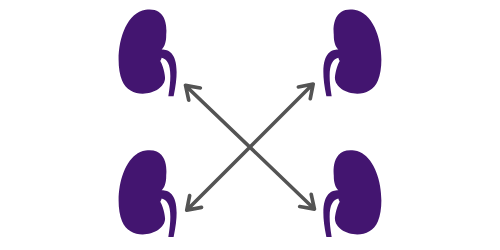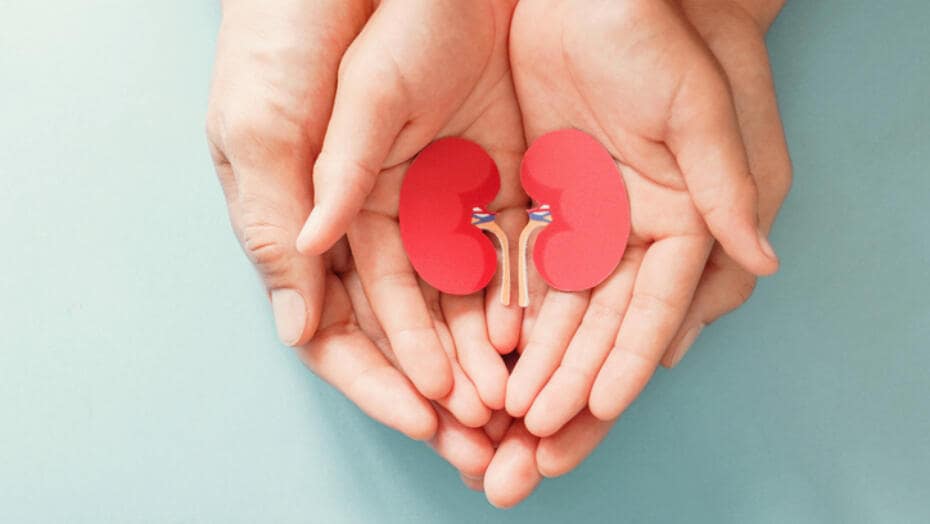FAQs For Living Donors
Asking for a kidney is a big deal and is considered a “Gift of Life”. Your safety, privacy and protection are just as important to me as they are to the Transplant Team. Living kidney donors can be blood relatives, non-blood relatives, friends and altruistic donors. Below are some FAQs to address your concerns.

Is the living donor procedure safe?
Living kidney donation overall is safe and is done by a minimally-invasive surgical technique called laparoscopic surgery which minimizes surgical incisions and reduces recovery time. In healthy individuals, donating a kidney will not raise your risk of kidney failure, diabetes or other health problems. People lead healthy lives with only one kidney and donating a kidney does not change your life expectancy. Kidney donation typically does not affect the ability to become pregnant or complete a safe pregnancy and childbirth. You should be able to go back to your regular diet and normal exercise program soon after the kidney donation. Doctors reported that living kidney donors can expect to live full and healthy normal lives. A living donor can donate one of his or her kidneys and the remaining kidney is able to perform all the necessary functions.

Is the procedure painful?
By using laparoscopic surgery, the procedure allows for a shorter hospital stay and quicker recovery time. Potential benefits of this technique include shorter hospitalization and a rapid return to normal activity. After kidney donation, most people are able to return to their regular daily activities after 2-3 weeks. On average, the hospital stay for living donors is approximately 1-2 days.

What are the criteria for eligibility?
Key criteria for being a direct match
- Age 18 years or older
- Healthy (Physically & Mentally)
- Two well-functioning kidneys
- Blood compatibility
- Tissue Type
- Completion of an evaluation at the transplant center

What is the evaluation process for kidney donation?
After you register online and complete the health questionaire as a potential donor, you will be contacted by a Living Donor Coordinator to answer all your questions and who will guide you through the transplant team evaluation process. During your clinic evaluation, you will have lab work done and meet with nurses, social workers, nephrologists, surgeons, donor advocates, and others, to assess your health and eligibility. Your Living Donor Coordinator will also discuss additional tests that will be required as part of the evaluation process.

Does insurance cover expenses for a living donor?
All medical expenses related to evaluation, surgery, hospitalization, & follow-up care are covered under my own personal health insurance and is not the responsibility of the donor's health insurance company. There is no personal financial responsibility placed upon the donor as well. More information will be provided to you during the consultation.

What if I’m not a match?
If you are eligible to donate but not a direct match, you can still be my donor! There are several ways to donate. The National Kidney Registry has a detailed overview of the options. The main three are:
Direct Donation
The donor is compatible with the recipient and can therefore give directly (healthy, blood type, and tissue typing test match).
Paired Swap
Incompatible donor and recipient pairs are matched with another incompatible duo for a one-to-one exchange, or ‘swap’.
Chain Donation
This is a type of paired exchange where multiple donor/recipient pairs are involved to ensure everyone gets their match.

Is a living donor kidney transplant your only option?
Dialysis therapy filters and purifies the blood using a machine. It is not ideal. In addition to the cumbersome nature of this treatment – most people are on it 3-4 days a week – it puts a lot of stress on the kidneys. Dialysis causes heart inflammation, anemia, blood pressure issues, and nerve damage, to name a few. It really isn’t a suitable replacement for a healthy well-functioning organ. For most it is a temporary solution while they wait for a transplant. Statistics show that after 5 years on dialysis less than 50% of patients are still living, while 80% of patients that received a kidney transplant are still living.
A deceased donor kidney transplant is possible, but the wait list is long. It can take between 5-7 years to receive a call. A deceased donor kidney is also typically not as healthy as one from a living donor. This results in lesser health outcomes short- and long-term. Currently there are more than 106,000 people waiting on a kidney transplant list in the United States.
The best option is a living kidney donor transplant.

I don’t see my question listed here…. What should I do?
Feel free to send me an email, give me a call or contact Dartmouth Hitchcock Medical Center.
Dartmouth Hitchcock Medical Center – Lebanon, New Hampshire
- Pre-Transplant Department: 603-653-3931
- Information: www.dartmouth-hitchcock.org
Will Vanasse
- 603-443-3402
- Wvanasse25@gmail.com
